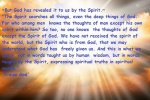( Ponder this)... A parable, or an allegory story
designed to illustrate or teach a moral lesson...to convey a
meaning indirectly by use of comparison.)
"Ponder these words carefully."........The Divine words tell
us precisely...what you see is not what is meant...'They look
and look, but do not see.'
This is a truth that has confused and bewildered the world.
Many comprehend not their understanding, man's imagination
has polluted God's 'inspiration' of...in Spirit and Truth."
'Praise God'
designed to illustrate or teach a moral lesson...to convey a
meaning indirectly by use of comparison.)
"Ponder these words carefully."........The Divine words tell
us precisely...what you see is not what is meant...'They look
and look, but do not see.'
This is a truth that has confused and bewildered the world.
Many comprehend not their understanding, man's imagination
has polluted God's 'inspiration' of...in Spirit and Truth."
'Praise God'
Attachments
-
44.6 KB Views: 22
-
9
-
5
-
3
- Show all




















